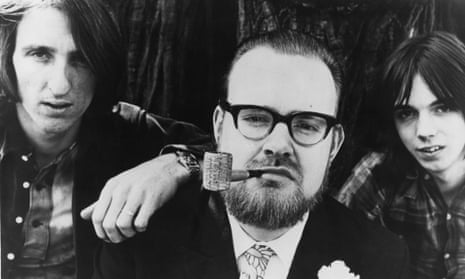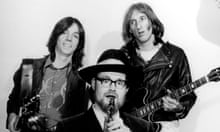Andy Newman, who has died aged 73, earned musical immortality as part of Thunderclap Newman, whose 1969 No 1 hit Something in the Air became one of the indestructible staples of British 1960s pop. Primarily a keyboard player with an idiosyncratic approach – schoolfriends nicknamed him Thunderclap in honour of his playing technique – Newman also played the saxophone, clarinet and penny whistle, but had no formal musical training.
The band that would become Thunderclap Newman was formed in late 1968 at the instigation of the Who’s Pete Townshend, and comprised Newman alongside a drummer and vocalist, John “Speedy” Keen, and a guitarist, Jimmy McCulloch, later of Wings. The musicians had previously collaborated on soundtrack music for a film being made by a friend of Townshend, though this material was never used. Keen had written the track Armenia City in the Sky for the Who’s 1967 album The Who Sell Out, and Townshend envisaged the new group as a vehicle for Keen’s songwriting.
During recording sessions at IBC Studios in Portland Place, central London, around Christmas in 1968, with Townshend producing and playing the bass under the pseudonym Bijou Drains, they recorded basic tracks for Something in the Air, Accidents and Wilhelmina. At the time, Newman was a telephone engineer for the General Post Office, but subsequently quit to be in the group.
Something in the Air was released as a single in May 1969. A gently euphoric anthem to the prevailing mood of social and political change, it somehow found room for Newman’s jazzy piano solo, a mix of honky-tonk and boogie-woogie styles incorporating crafty rhythmic shifts. The song rushed to the top of the UK charts and stayed there for three weeks. “It just happened to be the right moment for that particular song,” Newman reflected later. “I think there was destiny behind it to some extent.”
The song has enjoyed immortality thanks to its repeated use in movies that include The Magic Christian (1969), The Strawberry Statement (1970), Kingpin (1996), Almost Famous (2000) and The Girl Next Door (2004), and in commercials for TalkTalk, Coca-Cola and British Airways.
The band (augmented by the bass player Jim Pitman-Avory and McCulloch’s elder brother, Jack, on drums) supported Deep Purple on a 1969 British tour. However, a second single, Accidents, did not appear until May 1970 and barely made the UK Top 50. The group’s sole album, Hollywood Dream, was released in October 1970. It reached No 163 in the US and made no impression at all in Britain, though is now considered a neglected classic. In 1971 they supported Deep Purple again on British and Scandinavian tours, but broke up in April that year.
Newman was born in Isleworth, Middlesex, and grew up in Hounslow. His father, Charles, was originally from Birmingham, but moved south to take a student gardeners’ course at the Royal Botanic Gardens, Kew, and later became a park superintendent. His wife, Alice, worked at the ministry of pensions.
Andy’s first musical efforts were on his great-grandmother’s old wooden-framed piano, later replaced by an iron-framed upright model. His father would play Victorian ballads and short classical pieces, but Andy’s tastes inclined towards New Orleans jazz and dance bands from the 20s and 30s (he later collected 78rpm discs and became fascinated with early sound recordings). After leaving Bulstrode secondary school he joined the GPO as a trainee engineer.
Apart from a 1971 solo album, Rainbow, Newman was musically dormant and worked as an electrician, until he put together a new version of Thunderclap Newman in 2010 featuring Townshend’s nephew Josh and Big Country’s drummer Mark Brzezicki. They recorded the album Beyond Hollywood and played live shows, including an appearance at the 2012 Isle of Wight festival.
The bass player Tony Stubbings became a close friend of Newman, and was amazed by his musical inventiveness and vast general knowledge. “He was an eccentric with a brain the size of the world,” Stubbings recalls. “He was know- ledgable about everything and he’d talk for hours. He always wore brown boots and an green army jumper, even when he came to my wedding.”
In 1976 Newman moved into a housing cooperative in Clapham, south London, and became closely involved in its administration and in resisting Lambeth council’s eviction efforts. His fellow resident, Julian Hall, remembers demonstrating with Newman “outside a very glamorous Labour party fundraiser ... Andy was very idealistic about what the authorities could and couldn’t do.” Nevertheless, Lambeth eventually won, and Newman had recently been rehoused.
He is survived by his brother, Robin.



Comments (…)
Sign in or create your Guardian account to join the discussion